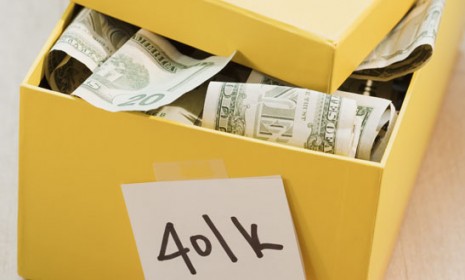Are 401(k)s a failed experiment?
As Baby Boomers approach retirement age, it's clear that most have not saved enough to live out their golden years in comfort

A free daily email with the biggest news stories of the day – and the best features from TheWeek.com
You are now subscribed
Your newsletter sign-up was successful
Baby Boomers latched onto 401(k)s in the late 1970s, when companies began switching from traditional pension plans to employee-funded retirement accounts tied to the ups and downs of the stock market. But now, many Boomers eager to quit working haven't saved nearly enough, and are heading toward a "faith-based retirement," says Joe Nocera at The New York Times, in which they have little to go on but faith that everything will be fine once they leave the workforce. Only 22 percent of workers over 55 have more than $250,000 socked away for their post-work life. And a shocking 60 percent have less than $100,000. Even with Social Security payments, that amount will dwindle quickly, and Boomers are increasingly putting off retirement and working into their late 60s and 70s. Are 401(k)s simply a bad retirement system?
Tying retirement to the stock market is a bad idea: Most people "lack the skill and emotional wherewithal to be good investors," says Nocera at The Times. That's why "linking investing and retirement has turned out to be a recipe for disaster." Average investors are prone to bubbles in the stock market, such as the tech bubble in 2000 or the housing bubble in 2008. Furthermore, most people are also vulnerable to personal financial shocks — a divorce, a health problem, or a job loss — that can force them to raid their 401(k) accounts. It's time to rethink the system.
The Week
Escape your echo chamber. Get the facts behind the news, plus analysis from multiple perspectives.

Sign up for The Week's Free Newsletters
From our morning news briefing to a weekly Good News Newsletter, get the best of The Week delivered directly to your inbox.
From our morning news briefing to a weekly Good News Newsletter, get the best of The Week delivered directly to your inbox.
Clearly, we ought to beef up Social Security: "The poverty rate among the elderly is rapidly increasing," says Kathleen Geier at Washington Monthly. And remember, the elderly are particularly vulnerable to financial difficulties arising from health problems, which will deplete their personal savings even more. The problem? Social Security benefits are way too low. The solution? The government ought to raise them.
"The Social Security benefits are too damn low"
Hold on. More government funding is not the answer: It's ridiculous for Nocera to trash the entire 401(k) system just because he messed up his retirement, says Glenn Reynolds at InstaPundit. And expanding Social Security would only make things worse: If "people aren't clever enough to plan their own retirement," then it's unlikely the government is "clever enough to plan for other people's retirement." There's "no evidence that the folks in Washington are any less dumb than the public at large."
"More on those underfunded/over-generous public pension plans"
A free daily email with the biggest news stories of the day – and the best features from TheWeek.com
-
 Why is the Trump administration talking about ‘Western civilization’?
Why is the Trump administration talking about ‘Western civilization’?Talking Points Rubio says Europe, US bonded by religion and ancestry
-
 Quentin Deranque: a student’s death energizes the French far right
Quentin Deranque: a student’s death energizes the French far rightIN THE SPOTLIGHT Reactions to the violent killing of an ultra-conservative activist offer a glimpse at the culture wars roiling France ahead of next year’s elections.
-
 Secured vs. unsecured loans: how do they differ and which is better?
Secured vs. unsecured loans: how do they differ and which is better?the explainer They are distinguished by the level of risk and the inclusion of collateral